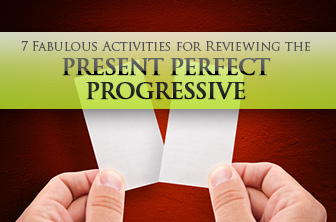7 Communicative Activities for Using the Past Perfect Progressive



When using the time markers since and for, your students can express certain activities they have been doing for a length of time. Write several time phrases on slips of paper (for two weeks, since last year, for my whole life, etc.) and put them in a hat. Each student draws a time from the hat and then expresses an activity he has been doing since that time or for that length of time using the present perfect progressive.
Stative Verbs (verbs that express a state of being rather than an action) are not used in the progressive. So even though a person may have engaged in one of these activities for a length of time, he will not use a progressive tense to express that fact. For example, ‘I have hated lima beans my entire life’ is correct and not ‘I have been hating lima beans my entire life’. Have your students work in groups of four or five to brainstorm a list of stative verbs that should not be used in the progressive tenses.
How have your students been spending their time lately? By using the present perfect progressive, they can express general events that have been occurring at unspecific times recently. Have each person share something that he or she has been doing recently by creating sentences using the present perfect progressive without time markers and including the adverb ‘recently’.
Have pairs of students work together to find things they have been doing longer than their partners by asking questions in the present perfect progressive. Have students ask questions until they can name five things they have been doing longer than their partners.
Have pairs of students ask each other if they have been doing certain activities for specific lengths of time. For example, ‘Have you been studying English for three years?’ Every student must answer ‘yes’ to the questions they are given regardless of the answer. Then, the first student must determine if their partner is telling the truth or bluffing. Award points for each correct guess.
Write several lengths of time on index cards (two weeks, five years, an hour, etc.). Make sure you have enough so each student gets four or five cards. They cannot show these cards to their classmates. Then, students mingle, moving around the classroom, asking each other questions and trying to get one of the answers on one of their cards. If a classmates answer matches a time on one of the cards, the student can discard that card. The first person to get rid of all his cards is the winner.
Have each person in your class research a celebrity. She should write ten statements describing that person using the present perfect progressive. For example, ‘She has been staring in films since she was four years old’. Students take turns reading their lists to the class until the class is able to guess the celebrity being described.